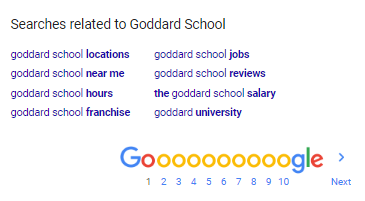How to Find Hidden Bad News In Corporate Search Results
Why did the organic for your branded search traffic just drop off? Was it a Google search algorithm change, or did your results’ content change? It’s a nightmare situation when suddenly you find that you’re ranking for negative search phrases appended to your brand name, like “fraud” or “scam.” Prospects are fleeing. The sales staff are freaking out.
Negative reviews ward off consumers like a leaky septic tank parked right in front of your storefront. You’re a legitimate company. You’ve been in business for years, and you do great work. But somehow, the internet has stamped a scarlet letter on your business’ brand, and it won’t go away.
Unfortunately, you may never be able to remove negative online content about your brand completely, but you may be able to mitigate the damage. But you need to know what queries people are entering to find the bad stuff before you can. Then you can do something about it.
Note: We provide a link to a simple reputation plan at the bottom of this post.
Search your brand’s basic search phrases first
You already know your brand name, it’s the obvious starting place so search that first.
Check Google Analytics for search phrases
Next, dig into your Google Analytics or other analytics dashboards on your site. This will show you what search phrases people have actually found your site with. Remember, though, these will only show you the search terms that led people to your page. It won’t show the negative phrases that drove people to competitor sites.
Use related searches for additional search phrases
After you conduct a basic branded search (just your brand’s name), check the “related searches” box at the bottom of the search results; just scroll down. It isn’t always there, but when Related Searches is it shows what other phrases people are using to find your business. For example, for the search term “Goddard School,” here are related searches:
If you are the owner of a Goddard School, these are examples of additional branded search phrases you might use as targets in a brand reputation enhancement campaign.
Navigational, informational, and transactional search query types
People perform three basic types of searches when interacting with your brand online.
- Navigational: When they are trying to find your site or a page within it.
- Informational: They’re not looking for your site but information that might be contained within it.
- Transactional: They want to buy something and find your site that way. They may never have heard of you before.
The important thing is to try different kinds of queries in order to see what your prospect sees before they decide to do, or not to do, business with you.
Use both Google and Bing because results are different
Search these phrases in both Google and Bing to see what others see. When you find something negative, whether it’s a review site, a less than delightful bloggers opinion, or an attack site, document the web address. The search phrases you uncover when performing ORM (online reputation management) research will reveal your own search results, as well as related results. From there you can see what your prospects are seeing.
Use Facebook and Twitter because Google doesn’t see all
Not all search results show up in Google and Bing, if pages are public in Twitter and Facebook you can search those too. We suggest going to those sites to perform a search to see what people are saying
Setup an alert using TalkWalker
TalkWalker will monitor your brand on the web for free. Google “talkwalker free” to find it. While you should perform a manual search the first time, Talkwalker will find many of the new mentions before you can.
What to do next
If you found no negative search results, bad reviews, or dicey articles, your search traffic drop may not have been due to a reputation problem with your brand, it may have been an algorithm change. To check major changes in search algorithms check out this site while you have your Google Analytics account (or other analytics dashboard) open. Compare the “temperature” with any sudden drops to see if there is a correlation.
Once you know what people are actually seeing, and you have reputation monitoring setup, your list of possible problem websites will help you break down which things can be removed, suppressed, or promoted.
If you want someone else to manage your brands reputation you can find out the various costs of reputation management on this page.
Negative branded search results FAQs
How do I examine negative branded search results?
Search your brand’s basic search phrases first. Then check Google Analytics for search phrases. Use related searches for additional search phrases. Use both Google and Bing because results are different. Use Facebook and Twitter because Google doesn’t see all. Setup an alert using TalkWalker.
What are the different types of online searches?
Navigational: When they are trying to find your site or a page within it. Informational: They’re not looking for your site, but information that might be contained within it. Transactional: They want to buy something and find your site that way. They may never have heard of you before.
What are related searches?
Related searches shows what other phrases people are using to find your business.
About the author
Kent Campbell is the chief strategist for Reputation X, an award-winning reputation management agency based in California. Kent has over 15 years of experience with SEO reputation management, Wikipedia editing, review management, and strategy. Kent has helped celebrities, leaders, executives, and marketing professionals improve the way they are seen online. Kent writes about reputation, SEO, Wikipedia, and PR-related topics, and is an expert witness for reputation-related legal matters. You can find Kent’s biography here.
–
Tags: Online Reputation Management Services, Reputation Management.


